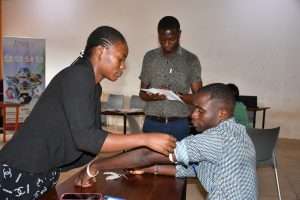The Department of Community Health and Development at North Coast Medical Training College (NCMTC) has launched its first Community Health Assistants (CHAs) Training of Trainers (TOT) program, aimed at strengthening grassroots healthcare delivery. This transformative training was conducted from 26th to 30th May 2025 and brought together eight participants for an intensive, hands-on learning experience.
The TOT program focuses on equipping CHAs with critical facilitation techniques that will enable them to effectively train Community Health Promoters (CHPs). The practical nature of this training ensures that future CHPs are not only knowledgeable but also competent in delivering essential health services across communities.
Key competencies covered in the training included:
- Taking blood pressure and blood sugar measurements
- Performing Cardio-Pulmonary Resuscitation (CPR)
- Delivering essential health education



Promoting preventive health practices within communities
The training emphasized interactive teaching strategies, demonstration skills, and community engagement approaches, ensuring that CHAs are prepared not just to deliver services, but to train others in doing so effectively.
This initiative has been made possible through the unwavering support of North Coast Medical Training College and in partnership with CHPF (Community Health Promotion Foundation). Both institutions have played a critical role in providing resources, technical guidance, and mentorship throughout the program.
A special note of appreciation goes to Dr. Waswa, Dr. Marianne, and Principal Madam Dorothy, whose leadership and vision have significantly contributed to the successful rollout of this milestone program.
Their commitment to community-centered health solutions continues to inspire growth and innovation in the health training sector.
According to the Department of Community Health and Development, this is just the beginning. There are plans to formalize the TOT course within the department’s regular training calendar. The aim is to continually empower CHAs by offering structured training opportunities that open pathways for career advancement and community impact.
The department is also extending an open invitation to alumni of the Community Health & Development program to take part in upcoming TOT intakes. Details of future cohorts will be announced in due course, as part of a broader strategy to strengthen the capacity of community health workforces.
Ultimately, the goal of this initiative is clear: to empower Community Health Assistants with the skills and confidence needed to become facilitators of learning—leading to the production of competent, well-trained Community Health Promoters who can deliver high-quality, accessible, and responsive health services at the grassroots level.
By building a network of trained trainers, the department envisions a ripple effect of knowledge, skills, and improved health outcomes within the communities they serve

